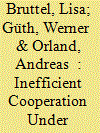| Srl | Item |
| 1 |
ID:
194800


|
|
|
|
|
| Summary/Abstract |
In dyadic ultimatum bargaining proposers, who are privately informed about the pie size, can exploit their “moral wiggle room” by engaging in unfairness which is unobservable by responders. Our setup instead assumes better informed responders and, as a consequence, limits ultimatum power and questions conflict resolution via acceptance of ultimatum proposals. In addition to testing the game theoretic solution, based on common opportunism, we assess whether two different market framings boost benchmark behavior. Our results confirm nearly universal responder opportunism. Although the benchmark proposer demand is modal, proposer choices display substantial variation, even in later rounds and even in the range in which lower demands would let both parties expect to earn more. Nevertheless, such inefficiently large demands become less frequent across rounds. Our results also show that market framing is insignificant and more so in later rounds.
|
|
|
|
|
|
|
|
|
|
|
|
|
|
|
|
| 2 |
ID:
186326


|
|
|
|
|
| Summary/Abstract |
Stochastic uncertainty can cause coordination problems that may hinder mutually beneficial cooperation. We propose a mechanism of ex-post voluntary transfers designed to circumvent these coordination problems and ask whether it can increase efficiency. To test this transfer mechanism, we implement a controlled laboratory experiment based on a repeated Ultimatum Game with a stochastic endowment. Contrary to our hypothesis, we find that allowing voluntary transfers does not lead to an efficiency increase. We suggest and analyze two major reasons for this failure: first, stochastic uncertainty forces proposers intending to cooperate to accept high strategic uncertainty, which many proposers avoid; second, many responders behave only incompletely conditionally cooperatively, which hinders cooperation in future periods.
|
|
|
|
|
|
|
|
|
|
|
|
|
|
|
|